By Rebekah Hall
U of A System Division of Agriculture
For many families, the start of the school year means a return to hectic extracurricular schedules. Brittney Schrick, extension assistant professor and family life specialist for the University of Arkansas System Division of Agriculture, said setting limits for the number of activities children can be involved in and maintaining a family calendar are key to easing the stress of busyness.
Schrick said it is critical for parents to limit the number of activities a child is involved in, especially in a family with multiple children, and to consider the schedule of the entire family.
“It is important to keep in mind the time commitment for the whole family, not just each individual kid,” Schrick said. “Sometimes families will think, ‘Well, Kid 1 has time to do this,’ but when they commit, they don’t consider that ‘Actually, Kid 2 has this other thing, and Kid 3 is scheduled for this, and Parent 1 has committed to this.’ They don’t take the whole calendar into account.”
Setting limits is not only helpful for navigating day-to-day schedules, but also necessary for children’s well-being.
“Kids need to have downtime when they’re not scheduled,” Schrick said. “They need to have time to relax, they also need to have time to do their schoolwork, and they need to have time to be bored. If they’re constantly scheduled, they don’t get those times. It’s about being thoughtful and intentional about what you allow your kids to be involved in.”
In addition to ensuring children have necessary downtime, teaching children about limits is important to helping them “exercise their muscle of making choices,” Schrick said.
“It’s okay to tell kids, ‘No, our family can’t afford to do that,’ or ‘We don’t have time to do that,’ or ‘That’s not a good fit for our family,’” she said. “All of those are completely acceptable ways to handle it. If you’re stretching beyond your limits so your kids can do everything they ever ask to do, they’re not going to learn to prioritize and manage their time.”
Schrick said she has seen the impact that over-scheduling has on the success of a child’s transition to adulthood. When these children arrive at college, they continue to overschedule themselves and sign up for too many activities, leaving themselves without enough time to do their schoolwork.
“These kids have been managed within an inch of their lives, and they do not know how to do it for themselves when they go to college because their parents have always done it,” Schrick said.
Because they can’t manage their own time, these students will burn themselves out, and their grades – and quality of life – suffer as a result.
“Set yourself up for success”
When it comes to managing busy family schedules, communication is key. All family members need to be on board and aware of each other’s comings and goings. A visual aid is critical to keeping everyone on track. This can look like a dry-erase calendar on the fridge or a chalkboard calendar on the wall – it can take a few tries to determine what method works best.
For families with tweens and teens, a digital calendar app, such as a shared Google or Apple calendar, can be a useful tool to reference “who is going where and when,” Schrick said. This way, children and parents can check the shared calendar before scheduling something else.
To ensure the timekeeping and schedule-making don’t default to just one parent, Schrick said it’s important for families to share this mental load among all the adults involved.
“It’s important to make sure that all of the adults who are responsible for taking children where they need to go – divorced parents, or a grandparent, or a babysitter – are on the same page about how that’s going to be managed,” Schrick said.
Schrick suggested setting a weekly time to meet – in person, through a phone call, over Zoom, or through a group text – to look at the week ahead and plan for its events.
“Some weeks everything works beautifully, but then the next week, one of your adults has to work late, or one of your adults has a meeting that’s out of town, and they normally take Kid 1 to this commitment, but now we have to find alternate transportation,” Schrick said. “Everybody needs to be involved in those conversations.”
By communicating and setting limits, families will find themselves better able to enjoy the fun of the activities they’re involved in.
“Don’t overtax your finances, don’t overtax your time resources, and don’t overtax your mental bandwidth,” Schrick said. “It’s all about setting limits for the adults and the kids to actually be able to enjoy the things you’re participating in – not rushing from one thing to the next without being able to actually enjoy it.”
To learn about extension programs in Arkansas, contact your local Cooperative Extension Service agent or visit www.uaex.uada.edu. Follow us on Twitter and Instagram at @AR_Extension. To learn more about Division of Agriculture research, visit the Arkansas Agricultural Experiment Station website: https://aaes.uada.edu. Follow on Twitter at @ArkAgResearch. To learn more about the Division of Agriculture, visit https://uada.edu/. Follow us on Twitter at @AgInArk.






